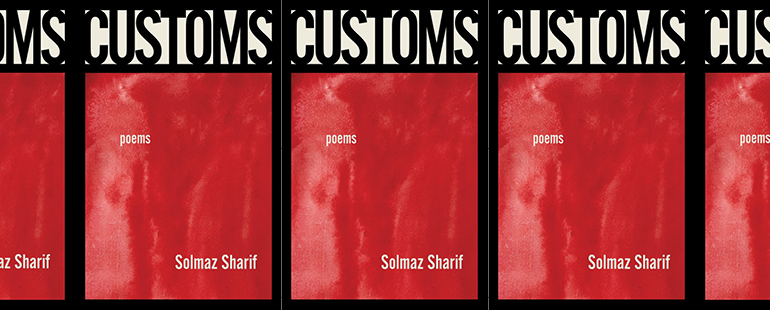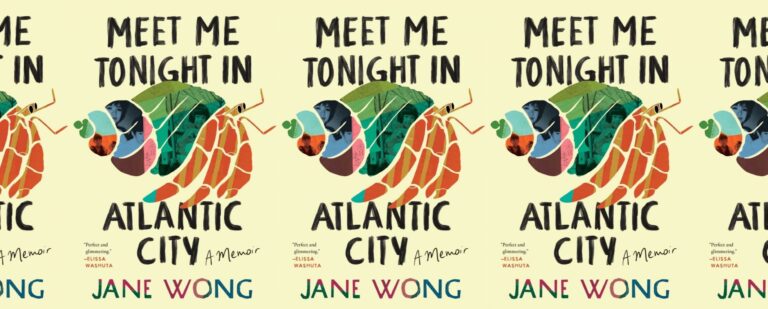Exploring “Withoutness” in Solmaz Sharif’s Customs

Customs
Solmaz Sharif
Graywolf Press | March 1, 2022
Customs, Solmaz Sharif’s sophomore outing after her critically-acclaimed Look, is a dazzling collection that explores themes of immigrancy, identity, and belonging. Sharif investigates the rituals we perform or are forced to conduct in order to belong or exist. What ceremonies bring us ease? Which allow us to belong—or pretend to belong—in community, but we sometimes wear as ill-fitting clothing? Which keep us out or threaten our existence?
Through her poems, Sharif rebels against gatekeepers, memorializing small and large violations of the spirit and body. She skillfully employs syntax and placement to signify the outsider experience, and how many voices and narratives have been silenced. Her poems often exhibit a wide expanse of white space to frame powerful linguistic fragments, which are complete in their vivid imagery yet leave room for personal interpretation. Many of them are also open-ended, punctuated within yet with closing lines that don’t end, much like the sentences that exiles operate under, amid demands: Who are you? Why are you here? For example, in the prose poem “Social Skills Training”:
Studies suggest How may I help you officer? is the single most disarming thing to say and not What’s the problem? Studies suggest it’s best not to mention problem in front of power even to say there is none.
Here, Sharif shows how language is a power structure, especially when it’s used by colonizers. In the brilliant poem, “The Master’s House,” which recalls Audre Lorde’s quote that “the master’s tools will never dismantle the master’s house,” Sharif uses language to damage said house, if not dismantle it completely. For the individual, bringing down an empire may be impossible, but one must still rebel with whatever tools are at hand, so as Lorde wrote: “the personal as the political can begin to illuminate all our choices.” Words are Sharif’s weapons, and they leave a mark. She recalls an encounter with an agent: “To disrobe when the agent asks you to / To find a spot on any wall to stare into” later contrasting with:
To recall the Texan that held a shotgun to your father’s chest,
sending him falling backward, pleading, and the words came
to him in Farsi
To be jealous of this, his most desperate language
To lament the fact of your lamentations in English, English being
your first defeat
Sharif interrogates the power structures that rule us—physical, linguistic, geographic, and governmental—as well as the unwritten demand that immigrants show gratitude to their oppressors for allowing them entry into their spaces. She questions how much of yourself, your words, and your history must you swallow for permission to rest in oft-times inhospitable soil:
History is a kind of study. History says we forgave the executioner. Before we mopped the blood we asked: Lord Judge, have I executed well? Studies suggest yes. What the fuck are you crying for, officer? the wire mother teaches me to say, while studies suggest Solmaz, have you thanked your executioner today?
Here, Sharif examines the futility of language to describe the hardest emotions, the ones that are nameless, residing in the gut, in the throat, or in flashing lights behind closed eyes. How legs shake and renege gravity when anticipating devastating news. Sharif uses language, often fragments with extended impact, to unveil the indescribable and to embody emotion that language can’t possibly express, but in such talented hands, somehow does.
In some sections, Sharif beautifully creates blizzards of white space with words or couplets, interspersed like small people from a distance or footsteps of those who’ve come before. The reading process forces our electronically trained mind and visual cortexes to slow down and also physically presents the hesitations of searching for words that may not be found, in languages in which one may not be fluent. Sharif’s language is spare and all the more sharp for what remains, for all that she has left out, as the sculptor does with a slab of marble. It’s telling that many of these poems explore such “withoutness” in one’s history, identity, and even language, and it’s through that withoutness that this collection takes shape, revealing an enormity of presence, of emotion, and of meaning.
The last page of the collection, the last lines—where it ends for us, at least—indicates an arrival, but a temporary one. For the immigrant, arrival and departure aren’t destinations as much as stoppages before the next expectation, the next ritual, the next journey.
And so upon that path
without obvious company,I set out, as she set out,
armed,[…]
in that dim red glow,
I wipe clean my blade
I tap at the doorI pass through there so that
Ending on the open-ended, unpunctuated “that”—and the duality of meaning of “passing”—with the next leg of the journey, the destination, and the reason for it unspoken, informs us, as if we need to be reminded, that this brilliant poet is not done, will never be done, as we will never tire of her devastating visions and words.
This is poetry—this is a poet—that marvels us in manners minute and majestic. That will always be current, of its time, of our times.


